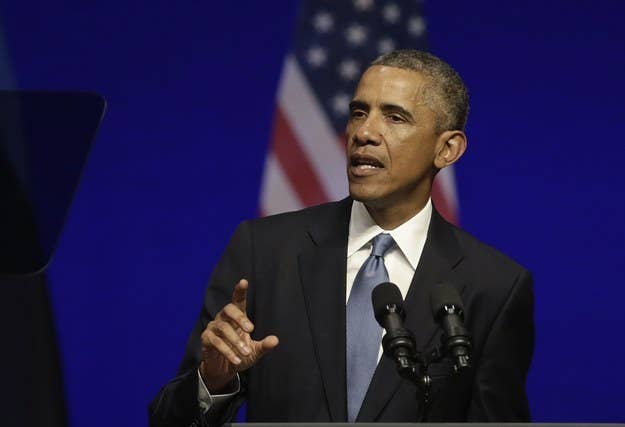
Later today President Obama will unveil his plan to "degrade and ultimately destroy" the Islamic State in Iraq and Syria, or ISIS, through an expanded military campaign in Iraq and likely Syria. But by ordering the military into action without explicit congressional authorization, Obama is falling back, at least in part, on the same controversial legal theories of executive power that he once rejected.
Not everyone is surprised by the presidential about-face. John Yoo, a former Bush administration lawyer and one of the primary architects of the "strong executive" theory of presidential power, told BuzzFeed News, "Obama has adopted the same view of war powers as the Bush administration."
In a preview of his speech on Sunday, Obama told Chuck Todd of NBC's Meet the Press that he was "confident that I have the authorization that I need to protect the American people." Obama repeated that same line in meetings with foreign policy pundits on Monday and again in meetings with congressional leaders on Tuesday.
That authority is Article II, Section 2 of the Constitution, which names the president commander-in-chief of the military. But not everyone is convinced that the clause, which opens Section 2, gives the president the authority Obama currently claims. Among those doubters is Obama himself, or at least the pre-presidential version.
In late 2007, as part of a candidate Q&A, Obama told Charlie Savage, "The president does not have power under the Constitution to unilaterally authorize a military attack in a situation that does not involve stopping an actual or imminent threat to the nation." And as Obama made clear in his Sunday appearance on Meet the Press, this is not the case in Iraq or Syria. "I want everybody to understand that we have not seen any immediate intelligence about threats to the homeland from ISIL. That's not what this is about."
This is about prevention and preemption, exactly the sort of thing that candidate Obama said presidents were not authorized to do without congressional approval. But Congress seems to have little desire to vote on military action ahead of midterm elections in November, and, after last year's confused approach to military strikes in Syria, Obama seems to have just as little interest in asking permission. Instead, whether out of expediency or outlook, he appears to have altered his views on constitutional power, and in doing so found himself relying on the same theories he once criticized.
The most obvious precedent for Obama's claim of expansive Article II power is a memo written nearly 13 years ago by John Yoo, who is perhaps most well-known as the author of the so-called "torture memos." Like Obama, then-President George W. Bush was looking for a way to use military force as a preemptive tool. Frustrated with a Congress that, even in the immediate aftermath of the Sept. 11 attacks refused to give the president preemptive power, Yoo came up with an innovative solution: He read it into the Constitution.
Relying on Article II, Yoo wrote: "The president may deploy military force preemptively against terrorist organizations or the States that harbor or support them, whether or not they can be linked to the specific terrorist attack of September 11." The fact that Congress had explicitly rejected the preemption language didn't matter because, in Yoo's reading, the president already had that authority.
"This is precisely the logic of the current and planned use of force against [ISIS]," Jack Goldsmith, another former Bush administration lawyer and currently a professor at Harvard Law School, pointed out recently on Lawfare, a blog he co-founded.
"What is remarkable," Yoo told BuzzFeed News, "is not that Obama eventually had to exercise the powers of his predecessors to protect American national security, but that his party in Congress, and his allies in the media and the universities, have remained so silent about it."
In an apparent attempt to elide some of these inconsistencies in constitutional interpretation, the White House is also considering what amounts to a backdoor authorization that, according to the New York Times, would have Congress appropriate money for Obama's military plans. A sort of gentleman's agreement that gets around direct congressional authorization, the plan would allow for deniability on both sides. Obama could claim he has congressional authorization without ever asking for a vote, while Congress could signal its support without individual members being forced to take a stand. President Bill Clinton retroactively used a similar maneuver in 1999 for airstrikes in Kosovo.
But for all the maneuvering, on the key issues of preemption and the expansive powers that a president has to deploy the military without direct Congressional authorization, Obama seems to have come around to the John Yoo school of law.
